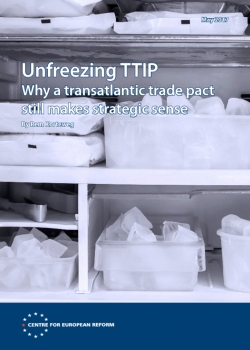
Unfreezing TTIP: Why a transatlantic trade pact still makes strategic sense
- The talks about a transatlantic trade and investment partnership (TTIP) are in the freezer, and as long as US president Donald Trump continues his protectionist and anti-EU message, they will stay there. But since Trump and the EU never formally cancelled the talks, TTIP could be brought in from the cold.
- Trump does not see trade deals in multilateral, strategic terms. And Europe’s heated debate about TTIP hardly takes the deal’s foreign policy dimension into account. But an agreement would deepen transatlantic co-operation at a time when the notion of ‘the West’ is increasingly in question. It would help push back against illiberal trade practices and strengthen the rules-based global trading order. And it would support European energy security.
- The lack of a deal would come at a cost. TTIP’s freeze sends a signal of Western disunity on global trade, raising doubts about America’s and Europe’s ability to protect the liberal economic system at a time of multipolarity and rising protectionism. TTIP’s freeze is both a symptom and a cause of the troubled state of the transatlantic relationship.
A #TTIP deal would push back against illiberal trade practices & strengthen the global trading order
- TTIP was designed, amongst other things, to identify areas of regulatory convergence between the EU and the United States. Transatlantic standards and trade rules would help promote a Western view of trade on the global level; a view based on open markets and high levels of consumer protection, guaranteed by the rule of law. The size and attractiveness of the ensuing transatlantic market and its higher regulatory standards meant the trade pact could set standards internationally, contributing to creating a global level playing field on transatlantic terms.
- Europe and the United States have a shared interest in countries like China respecting international trade rules and not distorting the market. It cannot be ruled out that at some point the Trump administration will seek to nudge China to play by the rules, rather than punishing it or resorting to protectionism. If that occurs, and Trump’s approach to the EU changes, Europe should stand ready to discuss with Washington the potential benefits of a transatlantic trade pact.
A #TTIP deal could boost Western economic influence & rein in China’s illiberal trading practices
- A transatlantic trade deal could boost Western economic influence, and in the process help rein in China’s illiberal trading practices. Even a mercantilist like Donald Trump might come to see the merit of this.
- By setting global standards on issues like sustainable resource extraction, state-owned enterprises and corruption, a transatlantic deal would help create the conditions for co-operation, not competition, with China’s ‘One Belt, One Road’ project. It would also create international economic incentives for domestic reforms in China.
- European energy security would benefit if a transatlantic deal guaranteed US energy exports in the event of European shortages.
Trump’s anti-trade rhetoric and his appointment of free-trade sceptics to senior positions in his administration offer a convenient excuse to European leaders to discontinue the trade talks. But they should use this halt to reflect how to win back European public support in favour of free trade. European governments need to take ownership of the debate on trade liberalisation; see trade negotiations as a campaign; exclude investment protection from a trade pact; and not shy away from publicly arguing the strategic merits of a deal.
Rem Korteweg is Head of the Europe in the world unit at the Clingendael institute. From 2013-17 he was a senior research fellow at the Centre for European Reform.

